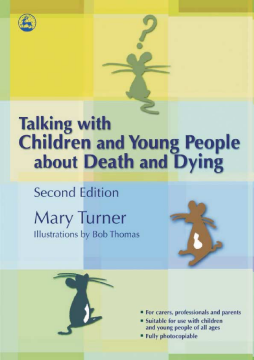
Additional Information
Book Details
Abstract
Talking with Children and Young People about Death and Dying is a popular resource designed to help adults talk to bereaved children and young people. Mary Turner explains the various aspects and stages of bereavement and offers useful insights into the concerns of children experiencing grief or facing an imminent bereavement. She addresses children's common fears and worries, dreams and nightmares, and acknowledges the effect of trauma on the grief process. This second edition includes a new section for adults on understanding the distress of a bereaved child and also a list of useful contacts.
It is a fully photocopiable workbook that enables adults to deal with these issues sensitively and explains, for example, how to choose appropriate words to support the child. It will empower and equip adults working with bereaved children to encourage them to communicate their pain and understand the often contradictory emotions aroused by the death of someone close to them.
Mary Turner is a psychotherapist and counsellor with considerable experience working with grieving children and families in social service, university, hospital, hospice and bereavement service settings. She is author of Someone Very Important Has Just Died also published by Jessica Kingsley Publishers. Mary lives in Worcestershire, UK. Bob Thomas was a painter and decorator by trade who, through his own experience of serious illness and bereavement, discovered his artistic talents.
Table of Contents
| Section Title | Page | Action | Price |
|---|---|---|---|
| INTRODUCTION | |||
| The International Context | |||
| Oxfam's Experience in Africa | |||
| A Note on Methodology | |||
| FOOD INSECURITY AND THE NEW WORLD ORDER | |||
| The 'New World Order | |||
| The Position of Africa | |||
| The devision of labour | |||
| The emergence of food insecurity | |||
| COPING WITH CHANGE | |||
| The Intensification of Production | |||
| Political Overview | |||
| The Development of 'Core' and 'Peripheral' Areas | |||
| The Marginalisation of Peripheral Groups | |||
| Patterns of Social Transformation | |||
| The Effects on the Enviroment | |||
| Coping with Change | |||
| LOCAL CONFLICT | |||
| Conflict and the resources | |||
| Wars of Subsistance | |||
| Breaking the Continuity | |||
| INTERNAL CONFLICT | |||
| Connecting Local and Internal Conflict | |||
| Limitations of Convetional Understanding | |||
| War as Political Economy | |||
| The political economy of groups: the Baggara of West Sudan | |||
| The political economy of movements: the SPLA in South Sudan | |||
| The political economy of movements: the MNR in Mozambique | |||
| The logic of food denial | |||
| WAR AND FAMINE | |||
| Structural Considerations | |||
| The overall Effect of War | |||
| Some Basic Parameters | |||
| The destruction and dislocation of markets | |||
| The destruction and dislocation of subsistence agriculture | |||
| The dislocation of populations | |||
| The effects on the family | |||
| The destruction and dislocation of social infrastructure | |||
| Contribution to economic decline | |||
| THE INTERNATIONALISATION OF PUBLIC WELFARE | |||
| The Conventions of War | |||
| The Internationalisation of Public Welfare | |||
| The Case For Reform | |||
| The question of targeting | |||
| The question of access | |||
| The question of sovereignty | |||
| Oxfam's Position | |||
| Summary and Conclusion | |||
| REFERENCES. |
